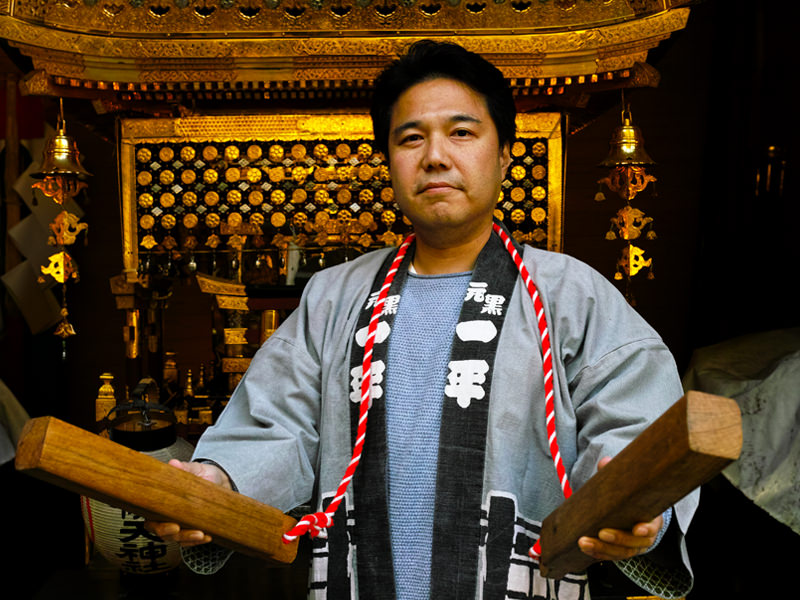Ueno Natives | 上野っ子
森重伸悟
Shingo Morishige


「上野には自分のことを上野の人って言う人がたくさんいるんだけど、僕はその殆どの人たちのこと知らないんですよ、実際」そう言って上野生まれのお祭り男は笑った。
森重伸悟さんの実家は上野でおでん屋と旅館業を営んでいた。
上野は東京でも有数の歓楽街であり、幼い頃の森重少年にとっては夜の街で働く人たちを目にすることは珍しいことでもなんでもなかった。
「なんでもありですからね、この街は」そう自分の育った場所を説明する。
「昔から上野は人の出入りが激しかった。彼らがどういう人たちであれ上野はみんなを受け入れてきたんです」
世間が持つ上野の印象として一般的なものは「多様さ」ではないだろうか。
例えば上野商店街のアメ横には500メートルの道に安い食堂から高価な宝石点まで約500ほどの店がひしめき合っている。
通りがあらゆる方向に張り巡らされ、まるで巨大迷路のようだ。
大晦日には何十万という人がここに押し寄せ、彼らが正月のおせちの具材などを買っていく風景は年末の日本の風物詩になっている。
しかしこの日本一有名な商店街を以ってしても、今の日本経済の停滞を乗り越えるのは簡単ではない。
多くの店が商売を諦め、上野から出て行った。
森重さんはこの状況を気にかけている。
「実際上野に住んでいる人たちの数が減っています。それに伴いコミュニティの質も変わってきました」彼は言う。
「僕たちはコミュニティを維持していかなくちゃいけない。上野はインフラもすごいし、人を呼び戻す力があるはずなんです」
森重さんは自他共に認める神輿バカである。
そこに担ぎ手が必要な限り、日本全国どこへでも出かけていく。
神輿を担ぐことが彼の使命だ。
「神輿を担がないまま家には帰れないですね」真剣な眼差しで彼は言う。
彼の神輿に対する情熱は地元のお祭りでのある出来事をきっかけに生まれた。
以前から、地元のお祭りの時に担がれずただ置かれているだけの小さな神輿があることに気づいていた。
ある時、町の先輩になぜ誰もその神輿を担がないのか聞いてみた。
町には神輿を担ぎたいという人間が十分にいないから、というのが先輩の答えだった。
その言葉が森重さんが神輿担ぎにのめり込むきっかけとなった。
さっそく翌年のお祭りに向けて神輿の担ぎ手を集め始め、20名がお飾りとなっていた神輿を担ぐために集結した。
それから地元のお祭りに外国人も含め200余名が神輿担ぎとして集まるようになるまで長い時間はかからなかった。
この活動を通じて森重さんは多くの神輿好きと知り合い、今では森重さんの祭りネットワークは日本だけにとどまらず世界中に広がっている。
「他の地域のお祭りに参加してみて分かったのは、部外者にオープンで優しいところもあれば、よそ者がそんなに歓迎されない土地もあるってことですね」と回想する。
別の地域のお祭りに参加するのは大切なこと、自分たちのコミュニティに何が欠けてるか見えるから、そう森重さんは強調する。
森重さんは上野以外のお祭りに行くことでコミュニティを良く保っていく術を学べると考えているが、同時に上野の良さに気づくことも多いという。
「角を曲がってよそ者になった途端、全部が難しくなる。外に出て初めて分かる有り難さ、ですね」
だからこそ彼にとって上野は「ホーム」なのだろう。
「自分にとってはこの街にいる人が実際に上野で生まれたかどうかはそんなに重要じゃない。今上野にいる人たちとこの街で起きていることを共有できればそれでいいと思います」
“There are many people calling themselves Ueno locals, but I don’t know most of them actually,” a Ueno-born festival lover says and smiles.
Shingo Morishige’s family ran an oden (Japanese traditional stewed food) shop and a ryokan (Japanese-style hotel) in Ueno from his grandfather’s time.
His hometown is one of the most famous amusement centers in Tokyo, and it was natural to little Shingo to see people working in entertainment business for adults.
“Anything could happen in this town,” he explains about the place he grew up.
“Since the old times, Ueno has always been a place with a lot of people coming and going. No matter who they were, Ueno has accepted everybody.”
Probably the most popular public impression of the town is “diversity.”
When you stroll about in the Ueno shopping district, you will find more than 500 shops from cheap restaurants to expensive jewelers within 500 meters.
Back streets are running in all directions, and it makes the entire area look like a maze.
Hundreds of thousands of people come to buy New Year’s foodstuffs on New Year’s Eve, and it is a typical scenery of the year-end of Japan.
However, even for this most popular shopping district in Japan it is not easy to get around the recession of Japanese economy.
Many shops shut down these days, and people moved out from Ueno.
Shingo is concerned about the current situation of his hometown.
“Quality of our community is changing because the number of people living in Ueno gets lesser and lesser,” he says.
“We must keep our community going. Ueno has advanced infrastructure and a potential to bring people back.”
Shingo Morishige is a festival enthusiast who loves to shoulder Mikoshi (a portable shrine for a Shinto festival).
No matter how far it is, Shingo goes to where a Mikoshi carrier is wanted around Japan.
He says that it is his mission to carry Mikoshi on his shoulder when he goes to a festival.
“Without shouldering Mikoshi, I cannot go back home,” Shingo states with a serious look.
The beginning of his Mikoshi enthusiasm can be traced back to his hometown’s festival.
Since he was young, there had been a small Mikoshi sitting and not being carried at a festival.
One time he asked his senior why nobody carried the Mikoshi.
The senior told him that there were not enough people willing to shoulder it in the town anymore.
That was when Shingo became interested in Mikoshi activities.
He started inviting his friends to the next year’s festival, and he collected 20 friends to carry the abandoned Mikoshi.
It didn’t take a long time until Shingo saw more than 200 people including international friends joining the festival.
Through this activity Shingo met many festival lovers, and today his festival connection spreads out not only in the country but also outside the country.
“I understood by seeing other communities’ festivals, some towns are open and friendly at their festivals, and some others are not so welcoming outsiders,” he says.
Shingo emphasizes that it is important to go to different communities’ festivals to see what is missing in his own community.
Shingo thinks that he can learn how to keep his community well when he joins festivals outside Ueno, but he also knows that he can learn good things about his hometown at the same time.
“Things get difficult when you go round the corner where you are an outsider. You never know how easy it is to do anything in your hometown until you leave there.”
This feeling is the reason for him to call Ueno “home.”
“To me, it doesn’t matter if people here were born in Ueno or not. As long as I can do something interesting with people who are currently living in Ueno, I’m content.”
